Upregulation of Parkin in endophilin mutant mice.
Cao, M; Milosevic, I; Giovedi, S; De Camilli, P
The Journal of neuroscience : the official journal of the Society for Neuroscience
34
16544-9
2014
Mostrar resumen
Several proteins encoded by PD genes are implicated in synaptic vesicle traffic. Endophilin, a key factor in the endocytosis of synaptic vesicles, was shown to bind to, and be ubiquitinated by, the PD-linked E3 ubiquitin ligase Parkin. Here we report that Parkin's level is specifically upregulated in brain and fibroblasts of endophilin mutant mice due to increased transcriptional regulation. Studies of transfected HEK293T cells show that Parkin ubiquitinates not only endophilin, but also its major binding partners, dynamin and synaptojanin 1. These results converge with the recently reported functional relationship of endophilin to the PD gene LRRK2 and with the identification of a PD-linked synaptojanin 1 mutation, in providing evidence for a link between PD and endocytosis genes. | 25471590
 |
Chemical-genetic disruption of clathrin function spares adaptor complex 3-dependent endosome vesicle biogenesis.
Zlatic, SA; Grossniklaus, EJ; Ryder, PV; Salazar, G; Mattheyses, AL; Peden, AA; Faundez, V
Molecular biology of the cell
24
2378-88
2013
Mostrar resumen
A role for clathrin in AP-3-dependent vesicle biogenesis has been inferred from biochemical interactions and colocalization between this adaptor and clathrin. The functionality of these molecular associations, however, is controversial. We comprehensively explore the role of clathrin in AP-3-dependent vesicle budding, using rapid chemical-genetic perturbation of clathrin function with a clathrin light chain-FKBP chimera oligomerizable by the drug AP20187. We find that AP-3 interacts and colocalizes with endogenous and recombinant FKBP chimeric clathrin polypeptides in PC12-cell endosomes. AP-3 displays, however, a divergent behavior from AP-1, AP-2, and clathrin chains. AP-3 cofractionates with clathrin-coated vesicle fractions isolated from PC12 cells even after clathrin function is acutely inhibited by AP20187. We predicted that AP20187 would inhibit AP-3 vesicle formation from endosomes after a brefeldin A block. AP-3 vesicle formation continued, however, after brefeldin A wash-out despite impairment of clathrin function by AP20187. These findings indicate that AP-3-clathrin association is dispensable for endosomal AP-3 vesicle budding and suggest that endosomal AP-3-clathrin interactions differ from those by which AP-1 and AP-2 adaptors productively engage clathrin in vesicle biogenesis. | 23761069
 |
Connecdenn, a novel DENN domain-containing protein of neuronal clathrin-coated vesicles functioning in synaptic vesicle endocytosis.
Allaire, Patrick D, et al.
J. Neurosci., 26: 13202-12 (2006)
2005
Mostrar resumen
Clathrin-coated vesicles (CCVs) are responsible for the endocytosis of multiple cargo, including synaptic vesicle membranes. We now describe a new CCV protein, termed connecdenn, that contains an N-terminal DENN (differentially expressed in neoplastic versus normal cells) domain, a poorly characterized protein module found in multiple proteins of unrelated function and a C-terminal peptide motif domain harboring three distinct motifs for binding the alpha-ear of the clathrin adaptor protein 2 (AP-2). Connecdenn coimmunoprecipitates and partially colocalizes with AP-2, and nuclear magnetic resonance and peptide competition studies reveal that all three alpha-ear-binding motifs contribute to AP-2 interactions. In addition, connecdenn contains multiple Src homology 3 (SH3) domain-binding motifs and coimmunoprecipitates with the synaptic SH3 domain proteins intersectin and endophilin A1. Interestingly, connecdenn is enriched on neuronal CCVs and is present in the presynaptic compartment of neurons. Moreover, connecdenn has a uniquely stable association with CCV membranes because it resists extraction with Tris and high-salt buffers, unlike most other CCV proteins, but it is not detected on purified synaptic vesicles. Together, these observations suggest that connecdenn functions on the endocytic limb of the synaptic vesicle cycle. Accordingly, disruption of connecdenn interactions with its binding partners through overexpression of the C-terminal peptide motif domain or knock down of connecdenn through lentiviral delivery of small hairpin RNA both lead to defects in synaptic vesicle endocytosis in cultured hippocampal neurons. Thus, we identified connecdenn as a component of the endocytic machinery functioning in synaptic vesicle endocytosis, providing the first evidence of a role for a DENN domain-containing protein in endocytosis. | 17182770
 |












